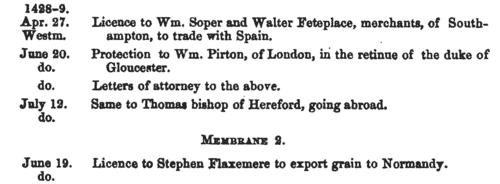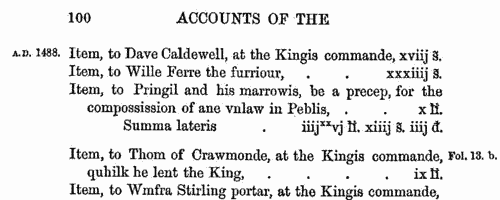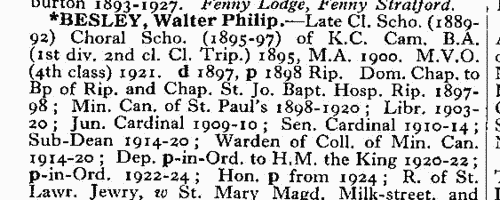Mude Surname Ancestry ResultsOur indexes 1000-1999 include entries for the spelling 'mude'. In the period you have requested, we have the following 6 records (displaying 1 to 6): Buy all | | | Get all 6 records to view, to save and print for £26.00 |
These sample scans are from the original record. You will get scans of the full pages or articles where the surname you searched for has been found. Your web browser may prevent the sample windows from opening; in this case please change your browser settings to allow pop-up windows from this site. The English in France
(1447)
King Henry VI of England (one of the grandsons of Charles VI of France) claimed the throne of France (and quartered the fleurs-de-lis of France with the lions of England on the royal standard) as had his predecessors since Edward III, as descendants of Philip IV of France. The English had real power or influence in Brittany, Normandy, Flanders and Gascony, and actual possession of several coastal garrisons, in particular Calais, where the French inhabitants had been replaced by English. Henry VI came to the throne only seven years after his father had trounced the French at Agincourt; but his cousin, Charles VII, who became king of France in the same year, spent his long reign rebutting the English king's claim to his throne by territorial reconquest and consolidation. The English administration kept a series of records called the French Rolls. On these are recorded royal appointments and commissions in France; letters of protection and safe-conduct to soldiers, merchants, diplomats and pilgrims travelling to France from England and returning, and to foreign legations. There are also licences to merchants to export to the Continent, and to captains to transport pilgrims. As Henry VI's reign progressed, and the English grip on northern France loosened, the French Rolls also increasingly include entries concerning the ransoming of English prisoners.MUDE. Cost: £6.00.  | Sample scan, click to enlarge

| Servants of the Scottish crown
(1473-1498)
Under the direction of the Lord Clerk Register of Scotland, the earliest Accounts of the Lord High Treasurer of Scotland, under the series Compota Thesauriorum Regum Scotorum, were abridged and published. This first volume, prepared by Thomas Dickson, curator of the Historical Department of the General Register House, was published in 1877. It contains the earliest surving accounts, from 1473 to 1474 in the reign of king James III, and the next, from 1488 to 1489 in the reign of king James IV. These were printed verbatim; but there then follow (page 166 onwards) accounts through to 1498 'considerably curtailed by the omission of unimportant entries'. These accounts are mostly lists of royal expenditure: many purchases of items for the court do not give the name of the merchants from whom they were bought, so the bulk of the personal names in the text are those of intermediaries, messengers, and various servants of the king.MUDE. Cost: £4.00.  | Sample scan, click to enlarge

| Tradesmen of York
(1272-1558)
No man or woman could trade in the city of York without having obtained 'freedom' of the city.Their names were recorded on the 'Freemen's Roll', or Register of the Freemen of the City of York, which contains about 19,900 names for this period. A list of names was prepared for each year, the year being here reckoned as starting at Michaelmas (29 September) until 1373, and thence at Candlemas (2 February). Each annual list starts with the name of the mayor and the camerarii or chamberlains. The chamberlains were freemen charged with the duty of receiving the fees of the new freemen; of seeing that only freemen traded in the city; and of preparing this roll, which was compiled from the names on their own account books from the receipts for the fees. There are three groups of freemen: those who obtained freedom after serving out an apprenticeship to a freeman; the children of freemen; and those who claimed freedom by 'redemption', i. e. by purchase or gift from the Mayor and Court of Aldermen.
MUDE. Cost: £2.00.  | Sample scan, click to enlarge

| Anglican clergy
(1930)
Crockford's Clerical Directory listed all Anglican clergy in the British Isles, India, the colonies, Europe, Asia and South America. The 59th annual issue, for 1930, is based on returns from all the individuals listed. The details given are: name (surname first, in capitals) in bold, prefixed by an asterisk in the case of university electors, and by a dagger whether the return had not been made, or it had been imperfectly filled up; name of theological college and/or university, and degrees, with years; a bold d followed by year and diocese signifies date of ordination as deacon and by which bishop; then a bold p, similarly for ordination as priest; posts (C: curate; I: incumbent; V; vicar; R: rector) with parishes and years; address; telephone number; and lists of books &c. where appropriate. In the case of the man then holding an English, Irish, Scottish or Welsh benefice, additional details are given - a bold P signifies the patron of the advowson; then the income, with items such as Q. A. B. (Queen Anne's Bounty), Eccles(iastical) Comm(issioners), Fees, e. o. (Easter Offerings), Pew Rents, T(ithe) R(ent) C(harge), Gl(ebe), &c.MUDE. Cost: £4.00.  | Sample scan, click to enlarge

| Aviators' Certificates
(1952)
Lists of certificates granted by the Royal Aero Club of the United Kingdom to newly-qualified aviators of powered aircraft: giving certificate number, full name, and name of his or her aero club, R.A.F. station, &c. Certificate numbers 27783 to 28078, issued from 30 November 1951 to 19 June 1952. This system of certification ended 24 March 1952, being replaced by pilots' certificates, in four classes.MUDE. Cost: £6.00.  | Sample scan, click to enlarge

| Flight Lieutenants: General Duties Branch (Branch List)
(1957)
The Air Force List for 1957 contains gradation lists for all serving officers, corrected, generally, up to the appointments and promotions gazetted 2 April 1957. The officers are listed by branch, rank, and date of seniority; the names are given surname first, initials, decorations, and various sets of initials relating to their particular qualifications or expertise. A double-headed dagger before the name denotes a permanent direct commission; a dagger a national service commission; an asterisk some other non-permanent commission. The main abbreviations are: a. a., qualified at Army Long Gunnery Staff Course (A. A.); c. f. s., qualified flying instructor (with an asterisk if A1 category, without, A2); I, 1st class interpreter; i, 2nd class interpreter; i. d. c., completed a course at the Imperial Defence College; j. s. s. c., completed a course at the Joint Service Staff College; P, on probation; p. f. c., graduate of Pilot Flying College; p. s. a., graduate of R. A. F. Staff College; p. s. c., graduate of Military Staff College; q. s., R. A. F. graduate of the Military or Naval Staff College; Sp, medical or dental specialist; t. p., graduate of Empire Test Pilots' School; Z, qualified in A. I. S. Inspection Duties. In the Ground Section lists a further set of abbreviations, in bold in brackets in front of the names, identifies certain specialities - AcC, aircraft control; Bal, balloon; FC, fighter control; Ph, photographic; PhI, photographic interpretation; RS, radar supervisor.MUDE. Cost: £4.00.  | Sample scan, click to enlarge

|
Research your ancestry, family history, genealogy and one-name study by direct access to original records and archives indexed by surname.
|








